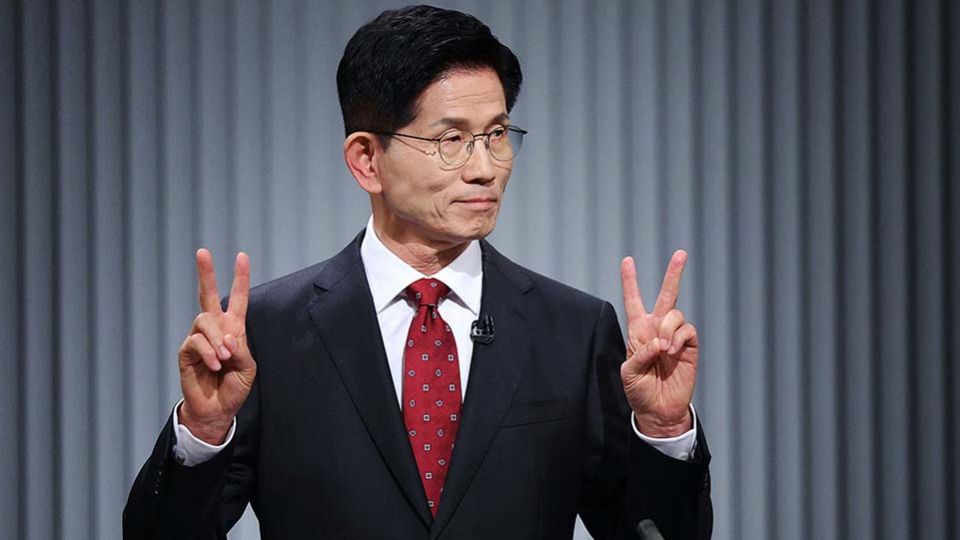May 26, 2025
SEOUL – Ballot printing for the June 3 presidential election commenced Sunday, meaning the first deadline for a potential consolidation of candidacies within South Korea’s conservative bloc has passed.
The ballots will feature the names of both Kim Moon-soo of the large People Power Party and Lee Jun-seok of the minor New Reform Party, essentially setting the conservatives’ separate bids in stone.
From this point on, even if either candidate withdraws, the ballot will not reflect the change and voters will only be informed by a separate notice posted at polling stations. Such a measure, by then, will likely reduce the impact of a possible last-minute merger and increase the risk of voter confusion and miscast ballots.
Kim has actively pushed for a unified candidacy with Lee, but Lee had consistently drawn a clear line through Sunday, expressing his determination to stay in the race until the end.
“People who share similar views and goals can usually form a unified candidacy,” Lee wrote in a Facebook post Sunday afternoon, rejecting the idea of merging his candidacy with Kim.
Earlier the same day, Kim said he would not give up efforts to field a single candidate, saying, “We’ve always shared the same roots, so I’ll keep trying,” keeping his overture open to Lee, the former leader of the People Power Party.
“We’re exploring meetings under different circumstances, but I’m not in a position to say when or how things will unfold,” Kim added.
Attention now turns to whether the two conservative camps can reach an agreement before early voting, scheduled for Thursday and Friday — a moment widely regarded as the effective final deadline for any merger.
If either Lee or Kim withdraws before early voting begins, the change will be reflected on ballots, as early voting ballots are printed on-site each day. However, any unification deal struck after voting begins will render all votes cast for the withdrawing candidate invalid.
Early voting has proven decisive in recent elections. In the 2022 presidential race, early turnout reached 36.9 percent — nearly half of the final 77.1 percent. Last year’s general election saw early voting turnout come within 2.5 percentage points of Election Day turnout.
If it happens, a merger between Kim and Lee Jun-seok could be crucial to defeating liberal Democratic Party of Korea front-runner Lee Jae-myung — especially as polling shows the conservative bloc’s combined support potentially overtaking Lee’s.
A recent survey released Sunday showed Lee Jae-myung leading with 47.3 percent, followed by Kim Moon-soo at 39.6 percent and Lee Jun-seok at 9.6 percent. The poll, conducted by local pollster Korea Society Opinion Institute, surveyed 1,001 respondents on Friday and Saturday.
With the final televised debate scheduled for Tuesday, just two days before early voting, pressure is expected to mount over a potential merger between Kim Moon-soo and Lee Jun-seok. Starting Wednesday, election law prohibits the release of new poll results, leaving little time for either side to make a final move.
As the stakes of a potential merger between Lee and Kim grow, the People Power Party is intensifying pressure on the New Reform Party candidate.
Rep. Ahn Cheol-soo and Rep. Na Kyung-won, both of whom competed in the People Power Party’s primary, have also urged Lee to withdraw and endorse Kim, stressing that time is running out.
Ahn characterized Lee’s refusal to merge as a strategic move to increase his leverage ahead of potential negotiations. He called Wednesday — the day before early voting begins — the “final deadline,” recalling that his own last-minute endorsement of then-candidate Yoon Suk Yeol in 2022 came just hours before early voting started.
Na echoed the concern, warning that “dividing in front of the great threat — Lee Jae-myung — will only harm the people.” She also voiced support for the People Power Party’s proposal, announced Saturday, to conduct a nationwide public poll to determine a unified conservative candidate.
The Democratic Party is also closely monitoring conservative merger talks — and framing the conservative bloc’s merger as both inevitable and ultimately self-defeating.
“The New Reform Party is essentially a spinoff of the People Power Party. Lee Jun-seok didn’t voluntarily leave — he was pushed out,” Lee Jae-myung said during a press conference Sunday. “They’re trying to regroup and reclaim control of the conservative base, and I think this will be their moment to merge.”
Another Democratic Party figure, Rep. Kim Min-seok, who heads the party’s election committee, argued that a merger between the two conservative candidates would not necessarily translate into greater support, pointing out that their voter bases are fundamentally different.
“Kim Moon-soo and Lee Jun-seok may try to merge, but their combined votes won’t add up the way they expect,” Kim said.


